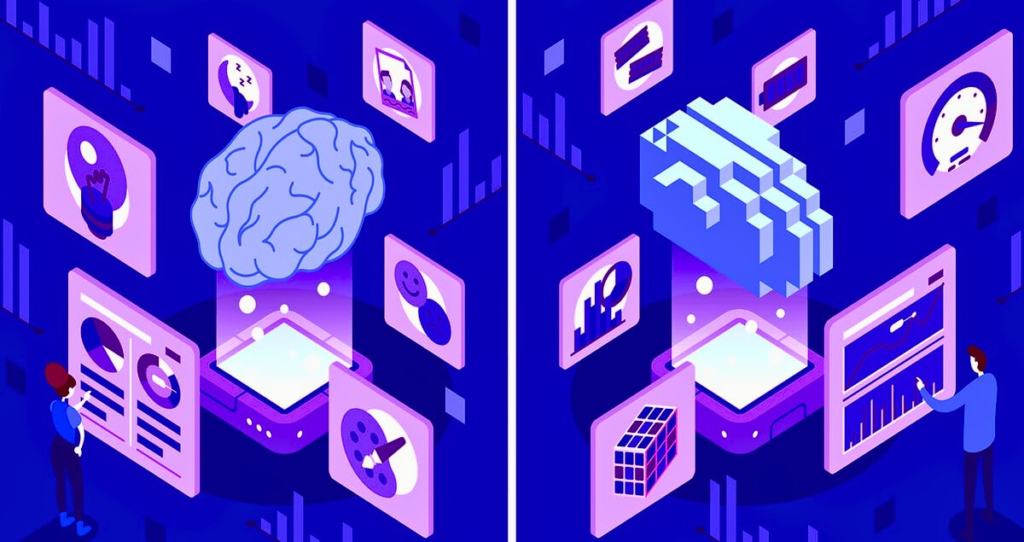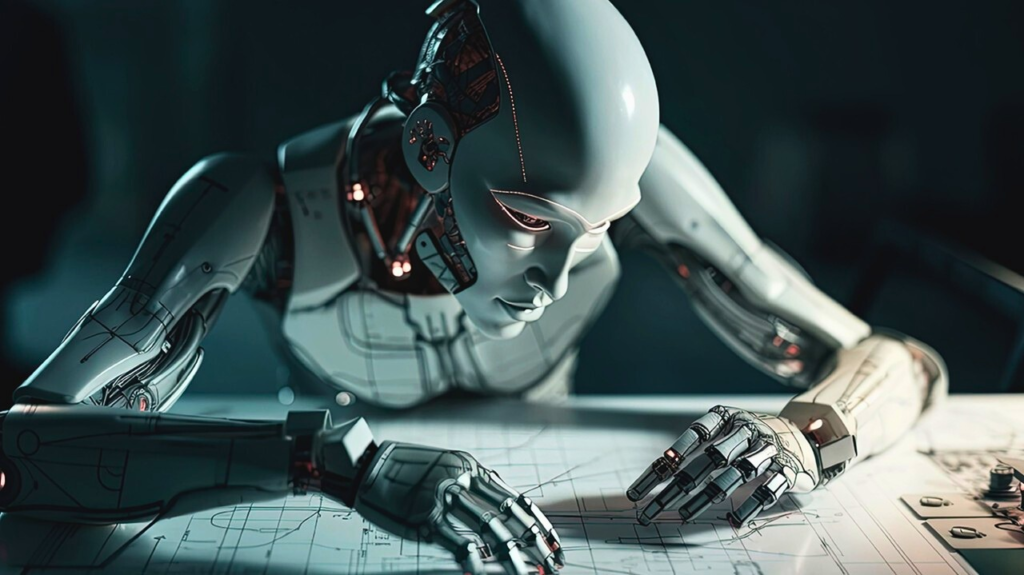
The existence of AI In the realm of writing computer programs is reshaping the way that product is created and changing the scene of the tech business.
From robotizing everyday undertakings to assisting with complex coding difficulties, the existence of AI in programming brings both gigantic potential and a few difficulties.
In this article, we investigate 20 strong ways the existence of AI is changing the field of programming.
Whether it alters programming improvement or achieves unanticipated outcomes, the existence of AI is unquestionably changing the way in which engineers approach their specialty.
1. Speeds up Code Age

One of the main ways the existence of AI is reshaping writing computer programs is by speeding up the course of code age.
Simulated intelligence fueled devices like GitHub Copilot can recommend whole code hinders or complete capabilities in view of a couple of lines of information.
The existence of AI in these apparatuses makes programming quicker and more proficient via computerizing a large number of the monotonous errands that customarily consumed an engineer’s time.
2. Improve Code Quality

The existence of AI in programming likewise prompts better-quality code.
Simulated intelligence can examine a lot of code, gain from best practices, and consequently propose enhancements.
This computerized code survey guarantees that product is of better, with less bugs and execution issues.
As the existence of AI advances, it’s supposed to lessen the event of mistakes and work on the general dependability of utilizations.
3. Decrease Human Blunder in Code

Human mistake is a typical issue in programming, whether because of little grammatical errors or ignoring significant advantage cases.
The existence of AI decreases these blunders via naturally recognizing expected issues and recommending fixes.
Computer based intelligence driven apparatuses can detect things that even the most experienced engineers could miss, prompting more exact and mess with free code.
4. Improve Troubleshooting Productivity
Troubleshooting is one of the most tedious parts of programming.
Be that as it may, the existence of AI has made the cycle more productive via computerizing bug recognition and fixing.
Man-made intelligence instruments can filter code for mistakes quicker than a human at any point could, pinpointing issues and offering potential arrangements.
Subsequently, engineers can invest less energy on troubleshooting and additional time on building new highlights.
5. Offer Better Code Advancement
Man-made intelligence is likewise making it more straightforward to advance code.
Through the existence of AI in programming, designers can robotize the most common way of working on the presentation of their product.
Man-made intelligence devices can propose enhancements for memory utilization, speed, and adaptability.
The existence of AI in the domain of improvement permits engineers to upgrade code proficiency without having to examine each line physically.
6. Give More intelligent Code Audit Cycles
The existence of AI has changed the code survey process.
Artificial intelligence fueled devices can consequently audit and study code as it’s composed, offering criticism progressively.
By dissecting the code against a huge number of best practices and past models, the existence of AI assists designers with further developing their code quality and stick to laid out guidelines.
7. Robotize Dull Undertakings
Many programming errands are dull and tedious.
The existence of AI computerizes these ordinary undertakings, permitting engineers to zero in on additional imaginative parts of coding.
Whether it’s creating standard code or refactoring existing code, the existence of AI in programming implies engineers can be more useful and less impeded by dreary work.
8. Expand Coordinated effort Among Engineers
The existence of AI in programming apparatuses encourages better cooperation among designers.
Artificial intelligence fueled stages permit designers to work more strongly, giving constant criticism on one another’s code.
This cooperative climate guarantees that code is reliable, proficient, and of top caliber.
The existence of AI advances consistent cooperation, which is fundamental in huge programming improvement projects.
9. Work on Complex Programming Dialects
Programming dialects, particularly lower-level ones, can be perplexing and challenging to dominate.
Be that as it may, the existence of AI can make these dialects more open by giving ideas and direction to designers.
Man-made intelligence apparatuses can help with making an interpretation of undeniable level rationale into machine-level directions, improving on complex undertakings and empowering engineers to compose more proficient code effortlessly.
10. Lessen Time-to-Market
The existence of AI in the product improvement cycle prompts quicker time-to-showcase for new applications.
Via robotizing undertakings like code age, investigating, and enhancement, engineers can invest more energy zeroing in on making imaginative highlights.
The existence of AI diminishes the improvement timetable, permitting organizations to send off items speedier and remain in front of contenders.
11. Build Efficiency
Efficiency is one of the best advantages of the existence of AI in programming.
Computer based intelligence devices can deal with a large number of the tedious parts of coding, from code ideas to mistake discovery.
By offloading these errands to simulated intelligence, engineers can zero in on more significant level programming, prompting more noteworthy efficiency and quicker improvement cycles.
12. Assist with Testing Computerization
The existence of AI has made testing more productive and computerized.
Man-made intelligence driven devices can consequently run tests on code, investigate the outcomes, and produce point by point reports.
These instruments might in fact propose fixes for bombed tests, decisively lessening the time engineers spend investigating and further developing programming quality.
13. Further develops Programming Security
The existence of AI is likewise a shelter for programming security.
Simulated intelligence frameworks can filter code for weaknesses and potential dangers a lot quicker than people.
The existence of AI in security apparatuses recognizes shortcomings early, permitting engineers to fix security openings before they are taken advantage of.
As digital dangers become progressively complex, the existence of AI in programming guarantees that product stays secure.
14. Empowers astute Documentation
AI is smoothing out the method involved with making and keeping up with documentation.
Man-made intelligence apparatuses can consequently produce documentation in light of the code composed, guaranteeing that designers don’t need to go through hours composing manual documentation.
By staying up with the latest naturally, AI guarantees that engineers have precise and significant data readily available.
15. Can Prompt Over-Dependence on Robotization
While the existence of AI offers many advantages, it can likewise prompt over-dependence on mechanization.
Designers might become reliant upon artificial intelligence devices for code age and investigating, possibly losing their capacity to compose or investigate code without computer based intelligence help.
AI in programming ought to be seen as a device to help designers, not supplant their abilities out and out.
16. Make Moral Worries in Programming
The existence of AI in programming raises moral worries, especially concerning predisposition and responsibility.
Simulated intelligence frameworks are prepared on huge datasets, and if those datasets contain predispositions, AI could propagate those predispositions in the code.
Engineers should stay watchful while utilizing man-made intelligence instruments to guarantee that they are not unexpectedly presenting unsafe inclinations or exploitative practices into their code.
17. Make Programming More Open
AI makes programming more open to those without broad coding experience.
With the assistance of artificial intelligence controlled code associates and learning instruments, novices can rapidly find a workable pace and begin composing utilitarian code.
The existence of AI democratizes programming advancement, permitting more individuals to add to the making of innovation.
18. Empower Ceaseless Combination and Sending
The existence of AI has enormously improved ceaseless joining and sending (CI/Cd) processes.
Computer based intelligence apparatuses can consequently convey code refreshes, run tests, and handle organizations more proficiently than manual strategies.
The existence of AI in CI/Cd guarantees quicker discharge cycles, less organization issues, and more smoothed out programming refreshes.
19. Speed up Advancement
The existence of AI in programming speeds up advancement by making it more straightforward for engineers to explore different avenues regarding groundbreaking thoughts and elements.
Via computerizing a large number of the ordinary errands related with coding, engineers have additional opportunity to zero in on imaginative critical thinking.
The existence of AI in writing computer programs is helping drive new, imaginative advancements that were beforehand unimaginable or excessively tedious to carry out.
20. Difficulties Customary Programming Schooling
At long last, the existence of AI challenges customary programming training.
As simulated intelligence instruments become more equipped for instructing and helping engineers, school systems should adjust.
The existence of AI in training could prompt better approaches for picking up programming, where understudies connect more with simulated intelligence driven apparatuses than with conventional techniques.
This change in how writing computer programs is shown will impact the up and coming age of designers.
End
The rise of AI in writing computer programs marks a transformative shift in the product development landscape.
By automating code generation, debugging, and optimization processes, AI accelerates the development cycle, allowing teams to bring products to market more swiftly than ever before.
This efficiency not only reduces development costs but also enables companies to allocate resources to more innovative aspects of product design and user experience.
Moreover, AI-driven tools enhance collaboration among developers, fostering a culture of continuous improvement and iterative design.
With AI’s ability to analyze vast datasets, developers can glean insights into user behavior and preferences, allowing for more informed decisions in product enhancements.
This data-driven approach ensures that updates are not only timely but also aligned with market demands.
Furthermore, as AI evolves, it will likely democratize programming skills, making it accessible to a broader audience.
Non-technical stakeholders can engage more deeply in the product development process, leading to more diverse perspectives and creative solutions.
However, this shift also raises important considerations about ethical programming practices, security, and the need for robust oversight to mitigate potential risks
As AI continues to shape the future of software development, its role will be pivotal in fostering innovation while ensuring responsible and sustainable practices.
From expanding efficiency and further developing code quality to